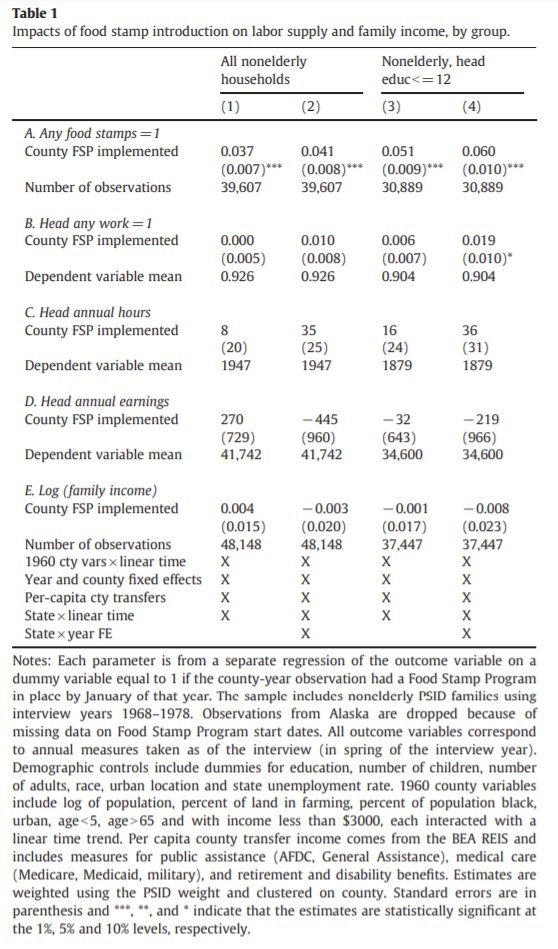This is a great discussion between @swinshi and @hamandcheese about child allowances; good on @AmerCompass to host it.
However, I have beef with @swinshi 's citations! He misread them! https://americancompass.org/event/family-feud-child-allowance-edition/
However, I have beef with @swinshi 's citations! He misread them! https://americancompass.org/event/family-feud-child-allowance-edition/
The one that stood out to me is this paper, Hoynes and Schanzenbach (2012). He says they found that single mothers reduced their work by 500 hours a year.
FIrst of all, I won't fault @swinshi too much for this, but even being generous, the study's actual number is 183 hours.
FIrst of all, I won't fault @swinshi too much for this, but even being generous, the study's actual number is 183 hours.
The issue here is "treatment effect" vs. "intent to treat." Scott is citing the authors' *guess* at a treatment effect, where they multiply their actually observed "intent to treat" effect by program participation rates.
But this is clearly an invalid estimate.
But this is clearly an invalid estimate.
Participants and non-participants may vary significantly, and of course even a generally eligible program like a family allowance would fail to have 100% coverage (not least because about 1% of parents and 2-3% of kids are ineligible due to the benefit cap).
(and another percent or so due to income phase-outs)
I understand the allure of the "treated-on-treatment" effect, but "intent to treat" is the correct estimate, since there's a theory out there which suggests income transfers could have differential effects among recipients and non-recipients.
Now, you might think 183 hours sounds really bad!
Here's the actual table.
What I want you to notice is that while the *hours* effect is significant, the *employment* effect is not, and that the earnings fall by only about $2 per hour of work lost.
Here's the actual table.
What I want you to notice is that while the *hours* effect is significant, the *employment* effect is not, and that the earnings fall by only about $2 per hour of work lost.
They found NO SIGNIFICANT EFFECT on total household earnings!
No effect!
A huge means-tested benefit program did not have any large significant effect on *total income* or on *employment*, just on *hours worked*.
No effect!
A huge means-tested benefit program did not have any large significant effect on *total income* or on *employment*, just on *hours worked*.
FOr non-white single moms with state fixed effects (specification 4), the only group with negative household head earnings effects, they actually found an insignificant *increase* in log family income. Less work, more income!
So what we're seeing here is that there was maybe a *small and noisy* disemployment effect, but a larger *hours reduction* effect, but that people who reduced hours made up for it on the hourly wage.
But the authors also make clear that focusing on single moms isn't really a great approach **since SNAP benefits are available to many people regardless of family status**. Could there be countervailing effects in other groups?
Well, surprise surprise, it turns out that when you look at all households with HS or less degrees, employment rose ever-so-slightly, as did hours worked.
But income fell. Weird!
I want to suggest that the main conclusion we should get from this paper is that SNAP's effects on *hours worked* may be significant, but its effect on *income earned* is not.
I want to suggest that the main conclusion we should get from this paper is that SNAP's effects on *hours worked* may be significant, but its effect on *income earned* is not.
And to the extent that we choose to disregard the significance issue and just take the noisy mean effects as gospel, there's *nothing* in this paper to compel us to think that the REASON SNAP reduced hours worked was income effects rather than phase-outs.
It's a good paper. But policymakers have no control over whether they succeed in treating people; they can only intend to treat, and so in policy debates, intention to treat is always the relevant factor. Saying, "if in a perfect world we had perfect treatment" is a red herring.
(And also the ability to reliably identify treatment effects when only like 20% of your intended group actually receives the treatment is highly questionable!)
I have no beef with the citations of the NIT studies. I just don't think a NIT is comparable to a child allowance, for much the same reason I don't think UBIs are comparable to child allowances.
I'm also perplexed by the citation of my work; my piece for IFS clearly showed that the effect of Romney's policy is *more support for marriage*. I truly cannot grasp where the idea is coming from that transfers inherently decrease marriage rates.
I think there's still a model operating here where "people get married to receive financial support from partners", but it's very clear that's no longer a primary motivation for marriage. The rise of "capstone" marriage is an important trend and shouldn't just be ignored.

 Read on Twitter
Read on Twitter



